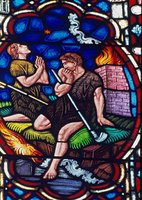
We’re studying Hebrews 11 right now. I can already tell that this is going to be another series where God really messes with us… or rather, “messes with ME.”
We started two weeks ago by looking at the first 2 verses. From those verses, we got a definition of faith. We learned that faith is acting on a God implanted hope. A hope that sees the unseen in a way that becomes more real than the things we see with our eyes.
So this week, we looked at Abel – the first in the list so many of us have come to know as the “Hall of Faith”. Abel, as you may recall, was the first homicide victim in the Bible. He and his brother both brought an offering to the Lord. His offering pleased the Lord, his brother Cain’s did not. Cain got ticked and killed him.
So a couple things came into focus for me this weekend…
A God-implanted Hope.So, what was Abel’s hope that he was acting on when he brought the better offering? I’ve been stewing on this for a couple weeks now; even looking ahead to the people who will be mentioned in the coming weeks. I can’t seem to get away from the thought that the “God-implanted hope” was not a specific task. It was bigger than that. Sure, specific actions flowed out of that hope as they acted in faith, but I’m thinking that the hope was on a pretty grand scale.
What if Abel’s “hope” was a restored worship? A proper understanding of who God is with a deep desire to respond to Him appropriately. Or how ‘bout Enoch? Could it be that he somehow had a God-planted hope, or longing for an intimacy with God that men hadn’t known since The Garden? Noah? 2 Peter 2:5 tells us he was a herald of righteousness. Did his God-implanted hope come from looking around and seeing nothing but evil?
I guess what I’m thinking is perhaps there was a hope for the Kingdom of God to be realized. To return to it. I’m not positive this holds up through the whole chapter, but it’s something I’m meditating on.
All of this also causes me to question what the God-implanted hope is in me. What is it in you?
Abel’s WorshipSomething else that came into focus for me this weekend had to do with worship. As pastor John talked about Abel’s worship, he asked us to consider our own worship. He said many churches being built today are built to be an auditorium, others are built more like a night-club. But, he said, really the sanctuary is an altar. As he said that, it occurred to me that an altar is really an instrument of death. It’s a place where you sacrifice something, and the thing being sacrificed is killed.
What does that mean for us? Well, it seems to me that if this is true (and I believe it is), then every time we come to worship, something in us must die. That’s pretty contrary to how we tend to think of worship. There are a lot of people out there (I call them worship junkies) who love the feeling they get when the music plays and they sing. Doesn’t sound very much like an execution, now does it? It seems to me that we do a pretty poor job of coming into worship with a right mindset. I’m afraid we tend to approach worship much more like Cain than Abel. An approach that asks the question “how little can I give and still fulfill my duty?” rather than “I am nothing, God is everything, He owns it all anyway, I’m going to give it all.”
Following Abel’s lead, the only thing we should desire to get out of worship is the pleasure of God. In the end, his reward was simply that… and an intimacy with God (through death) that exceeded any other reward.
What’s in a Name?Lastly, it was pointed out that Abel is a name that means “vapor”, or “nothing”. Here one minute, gone the next. Now, pastor made a bit of a joke about how maybe his parents coulda done a better job naming him. But I got thinking that maybe his name was sort of prophetic. Could it be that his name speaks to his understanding of his self importance in light of the greatness of God? Could it also be that God knew that Vapor’s (Abel’s) life would be cut short? Here one moment, gone the next.
Not “preaching”… just pondering.

